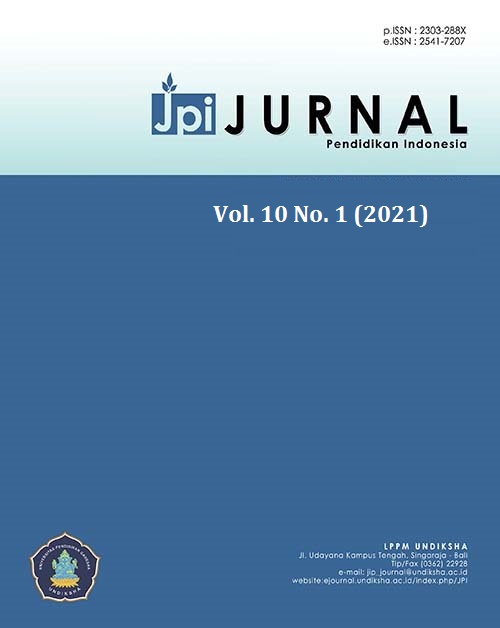Designing the E-Authentic Assessment on Computer Networking Learning in The Revolution Industry 4.0
DOI:
https://doi.org/10.23887/jpi-undiksha.v10i1.24431Keywords:
Authentic Asessment, Online, 4CAbstract
The unavailability of assessment instruments that accordance to the KKNI-based higher education curriculum is also the basis of the research. This study aims at producing an online assessment evaluation model design. The type of this research was Research and Development (R&D). The research subjects were information system study program students of the Universitas Dharmas Indonesia who took the Computer Networking course. The research data were obtained through validaty and practicality instrument and also observations. Based on the research results, it can be concluded that the online authentic assessment evaluation model that has been designed can be implemented to improve learning competence. Based on descriptions and validations of each material expert, media expert, and learning expert, the results
References
Azwar, S. (2015). Reliabilitas dan Validitas. Pustaka Belajar.
Basuki, Ismet, & Hariyanto. (2014). Asesmen Pembelajaran. PT. Remaja Rosdakarya.
Brown, A., Kirpal, S. R., & Rauner, F. (2007). Identities at Work. Springer Netherlands.
Brown, J. S., Collins, A., & Duguid, P. (1989). Situated cognition and the culture of learning. Educational researcher, 18(1), 32-42. https://doi.org/10.3102/0013189X018001032.
BSNP. (2010). Paradigma Pendidikan Nasional di Abad-21. Badan Standart Nasional Pendidikan.
Clariana, R., & Wallace, P. (2002). Paper-based versus computer-based assessment: Key factors associated with the test mode effect. British Journal of Educational Technology, 33(5), 593–602. https://doi.org/10.1111/1467-8535.00294.
Council, N. R., Education, D. B. S. S., Education, C., Assessment, B. T., Assessment, C. F., Glaser, R., … Pellegrino, J. W. (2001). Knowing What Students Know: The Science and Design of Educational Assessment. National Academies Press.
Council, N. R., Education, D. B. S. S., on Behavioral, C. S. S., & Practice, C. D. S. L. C. L. R. E. (2000). How People Learn: Brain, Mind, Experience, and School: Expanded Edition. National Academies Press.
Doran, R. L., Chan, F., & Tamir, P. (1998). Science Educator’s Guide to Assessment. National Science Teachers Association.
Eko Risdianto. (2019). Analisis Pendidikan Indonesia di Era Revolusi Industri 4.0.
Griffin, P., & Care, E. (2015). Assessment and Teaching of 21st Century Skills. Switzerland: Springer.
Gulikers. (2006). Authenticity is in the Eye of the Beholder. OpenUniversiteitNedherland, (Authentic Assessmen), 160.
Lampinen, J. M., & Arnal, J. D. (2009). A Revision of Bloom’s Taxonomy: An Overview. American Journal of Psychology, 122(1), 39–52. https://doi.org/10.1207/s15430421tip4104.
Lemmo, A., & Mariotti, M. A. (2017). From paper and pencil- to Computer-based assessment : several issues raising in the comparison. Cerme 10, (1993).
Majid, A. (2015). Penilaian Autentik Proses dan Hasil Belajar. PT. Remaja Rosdakarya.
Mukminan. (2014). Tantangan Pendidikan di Abad 21. Seminar Nasional Teknologi Pendidikan 2014. Universitas Negeri Surabaya.
Oji Kennedy, O. (2011). Philosophical and Sociological Overview of Vocational and Technical Education in Nigeria. International Journal of Academic Research in Business and Social Sciences, 01. https://core.ac.uk/download/pdf/25801184.pdf.
Oosterhof, A. (2014). Developing and Using Classroom Assessments. Pearson Education.
Osman, K., Hiong, L. C., & Vebrianto, R. (2013). 21st Century Biology: An Interdisciplinary Approach of Biology, Technology, Engineering and Mathematics Education. Procedia - Social and Behavioral Sciences, 102(Ifee 2012), 188–194. https://doi.org/10.1016/j.sbspro.2013.10.732.
Partnership for 21st Century Learning. (2015). P21 Framework Definition. Retrieved September 15, 2018, from http://www.p21.org/our-work/p21- framework/P21_Framework_Definitions_New_Logo2015.pdf%0A.
Razmawaty Mohamed, & Lebar, O. (2017). Authentic Assessment in Assessing Higher Order Thinking Skills. 7(2), 466–476. https://doi.org/10.6007/IJARBSS/v7-i2/2021.
Rhenald Kasali. (2018). Disruption (9th ed.). Gramedia.
Rosyada, D. (2007). Paradigma Pendidikan Demokratis. Kencana Prenada Media Group.
Setemen, K. (2010). Pengembangan evaluasi pembelajaran online. Jurnal Pendidikan Dan Pengajaran, 43(3), 207–214. https://ejournal.undiksha.ac.id/index.php/JPP/article/viewFile/124/118.
Setemen, K. (2014). Pengaruh Jenis Asesmen Terhadap Hasil Belajar Pemrograman Komputer. Prosiding Seminar Nasional Forum Pimpinan Pascasarjana LPTK Indonesia.
Shelia, T. Y. (2014). Transforming pedagogies: Integrating 21st century skills and Web 2.0 technology. Turkish Online Journal of Distance Education, 12(1), 166–173. https://doi.org/10.17718/tojde.32300.
Stiggins, R., & Chappuis, J. (2006). What a Difference a Word Makes: Assessment “for” Learning Rather than Assessment “of” Learning Helps Students Succeed. Journal of Staff Development, 27.
Sugiyono. (2014). Metode Penelitian Kuantitatif Kualitatif dan R&D. Alfabeta.
Tassinari, M. G. (2016). Assessment for learning – assessment for becoming. (July).
Trilling, B., & Fadel, C. (2009). 21st Century Skills: Learning for Life in Our Times. Wiley.
Wahyuningsih, R., Wahyuni, S., & Lesmono, A. D. (2016). Pengembangan Instrumen Self Assessment Berbasis Web. Jurnal Pembelajaran Fisika, 3(1), 338–343. http://jurnal.unej.ac.id/index.php/JPF/article/view/3087.
Wing-shui. (2012). The Impact of Peer Assessment and Feedback Strategy in Learning Computer Programming in Higher Education. Issues in Informing Science and Information Technology, 9.
Wulan, A. R. (2009). Kemampuan Calon Guru Biologi Dalam Menyusun Rubrik Analitis Pada Asesmen Kinerja. XIV(1), 45–48. https://doi.org/10.21831/jpms.v14i1.172.
Zubaidah, S. (2018). Mengenal 4C: Learning and Innovation Skills untuk Menghadapi Era Revolusi Industri 4.0. 2nd Science Education National Conference, (April), 1–18. Retrieved from https://www.researchgate.net/publication/332469989_Mengenal_4c_Learning_And_Innovation_Skills_Untuk_Menghadapi_Era_Revolusi_Industri_40_1.
Downloads
Published
Issue
Section
License
Authors who publish with the Jurnal Pendidikan Indnesia agree to the following terms:
- Authors retain copyright and grant the journal the right of first publication with the work simultaneously licensed under a Creative Commons Attribution License (CC BY-SA 4.0) that allows others to share the work with an acknowledgment of the work's authorship and initial publication in this journal.
- Authors are able to enter into separate, additional contractual arrangements for the non-exclusive distribution of the journal's published version of the work (e.g., post it to an institutional repository or publish it in a book), with an acknowledgment of its initial publication in this journal.
- Authors are permitted and encouraged to post their work online (e.g., in institutional repositories or on their website) prior to and during the submission process, as it can lead to productive exchanges, as well as earlier and greater citation of published work. (See The Effect of Open Access)








